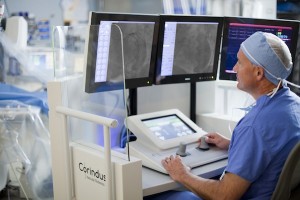The parking lot at the Rambam Health Care Campus is a dual-purpose facility capable of converting into a fortified 2,000-bed underground hospital in times of conflict. (photo from Rambam Health Care Campus)
Not unexpectedly, southern Israel suffered more than other areas of the Jewish state during this summer’s conflict with Hamas. Yet up in northern Israel, 30 doctors from the Haifa-based Rambam Health Care Campus (RHCC) were drafted into the Israel Defence Forces (IDF).
“Israel is a small country, so everything affects you whether you are in the conflict or not,” Prof. Rafael (Rafi) Beyar, a renowned cardiologist and the director general of RHCC, told this reporter.
Now, in the aftermath of the 50-day summer war, RHCC is proving that medicine has “no borders,” in Beyar’s words. The week of this interview, doctors at the hospital conducted a successful kidney transplant on a 14-year-old boy from Gaza.

The largest hospital in northern Israel, RHCC serves more than two million residents and functions as the primary medical facility for the Northern Command of the IDF. In addition to treating Gazan patients and training Palestinian physicians, the hospital is receiving wounded Syrian refugees.
Many of RHCC’s Gazan patients are children facing cancer and kidney diseases.
“These kids don’t have any other solutions,” Beyar said.
While suffering from kidney failure, the Gaza boy treated this week also had a blood condition that obstructed some of his blood vessels. Doctors first needed to check for useable blood vessels, and only then could they transplant his sister’s kidney into his body. When it became clear that the boy’s functioning blood vessels could not sustain the new kidney, doctors implanted a synthetic connector that saved his life.
On the Syrian front, RHCC has received nearly 100 wounded refugees over the past few months. IDF soldiers provide the necessary immediate treatment for injured refugees at the Israel-Syria border in the Golan Heights, and then bring them to the hospital. Most of the Syrian patients have sustained injuries from shock, bombs and other blasts. When they are treated and recover, most return to Syria, but some don’t want to go back, said Beyar.
Like the patients from Syria, most of the Gazan patients are thankful for the treatment they receive from RHCC. Although Beyar doesn’t know what happens to the patients once they return to Gaza, he said, “Someone who is treated and whose life is saved knows how to appreciate that.” Beyar added that he believes Israeli medical treatment of Gazans “has a long-term impact” on how Palestinian civilians view Israel.
Read more at jns.org.

